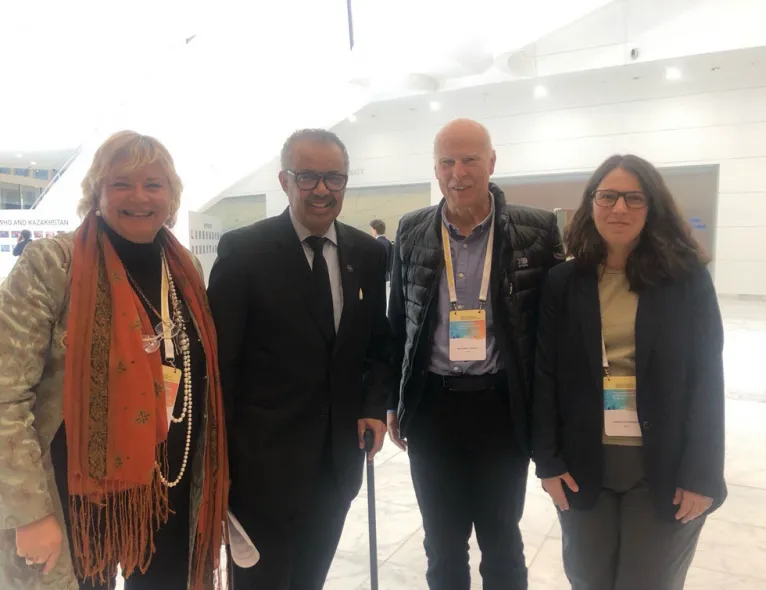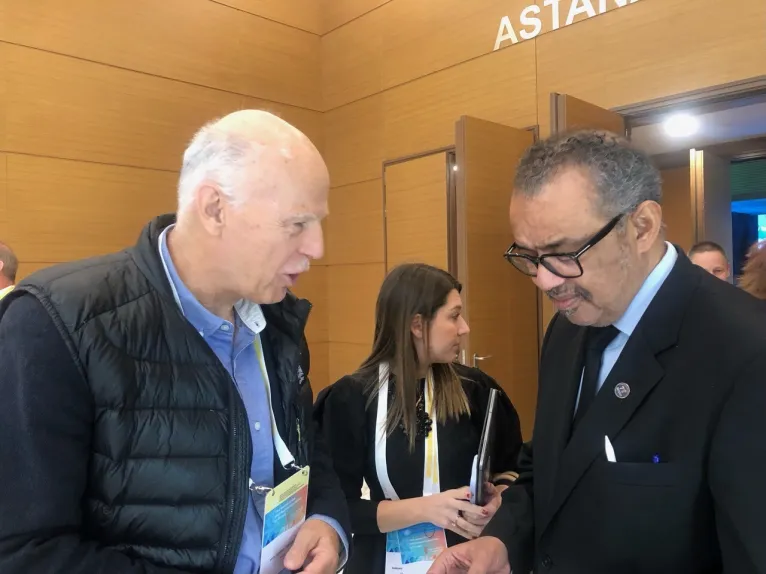 |
Pictured left: Prof Matilda Leonardi (EAN), Dr Tedros Ghebreyesus (WHO), Prof Wolfgang Grisold (WFN), Dr Ksenia Pochigaeva (WFN Intern). |
The World Federation of Neurology President Prof. Wolfgang Grisold met with health ministers and high-level delegates from the 53 Member States of the WHO European Region, as well as representatives of partner organizations and civil society, at the 73rd session of the WHO Regional Committee for Europe ⧉ on 24-26 October 2023, in Astana, Kazakhstan.
The meeting was hosted by the Government of Kazakhstan, under the patronage of His Excellency Mr Kassym-Jomart Tokayev, President of Kazakhstan.
In 2023, WHO marks its 75th anniversary, 45 years since the signing of the historic Alma-Ata Declaration on primary health care (PHC), and the mid-point of the European Programme of Work (EPW) 2020–2025 – “United Action for Better Health in Europe”. RC73 was an opportunity for delegates to reflect on the current state of health and well-being across the Region, take stock of progress in delivering the EPW, celebrate public health milestones over the past 75 years, and discuss what is needed to address current and future challenges.
The WFN as a non-state actor appreciates the opportunity to contribute to the WHO Regional Committee for Europe (RC73) addressing the state of health in Europe and flagging the need of implementation of the Intersectoral Global Action Plan on Epilepsy and Other Neurological Disorders.
We acknowledge the progress made in healthcare infrastructure, research, and healthcare delivery in Europe. However, challenges persist, including health inequalities, rising burden of neurological disorders and the impact of the pandemic and ongoing crises. There are pronounced treatment and diagnostic gaps, especially in Eastern European countries. The WFN remains committed to working collaboratively with the WHO and Member states to address these issues and enhance healthcare systems to meet the evolving needs of our populations.
The WFN is dedicated to advancing care, research and education - in epilepsy and other Neurological Disorders - globally and is committed to support the WHO in the implementation of the IGAP, which aligns with our shared mission to enhance the health and well-being of individuals affected by these conditions. We believe that a comprehensive, multidisciplinary and multiprofessional, integrated approach is essential to address these challenges effectively. We emphasize the importance of Universal Health Coverage as a fundamental pillar in achieving better health outcomes for all.
 |
Wolfgang Grisold explains the importance of brain health and IGAP. |
We address the pressing need to increase funding for translational research in neurology and epilepsy. Research and innovation is the cornerstone of progress in understanding these conditions, developing innovative treatments, and improving the quality of life for people with lived experience. Endorsed by our partner, the International League Against Epilepsy (ILAE), we call upon Member states and all the stakeholders to allocate and mobilize more resources for research, thereby enabling the scientific community to make significant strides in combating these disorders.
The WFN commends the WHO European Region for its dedication to improving the health and well-being of its citizens. We pledge our continued support and partnership in the pursuit of effective strategies to combat epilepsy and other neurological disorders and to advance the state of health in Europe.







